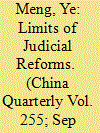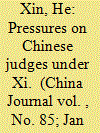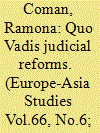| Srl | Item |
| 1 |
ID:
192631


|
|
|
|
|
| Summary/Abstract |
This article investigates the implementation effects of China's recent reforms to centralize its court system and offers an explanation of why such centralization efforts largely failed. Drawing upon in-depth interviews with judicial personnel from four localities, the study shows that local courts’ structural dependence upon same-level party-states is perpetuated or, in some cases, is even exacerbated, despite the unprecedented reform plans to centralize the budgetary and personnel management of the judicial system. Further investigation finds that, contrary to what existing assessments suggest, implementation failure is less a result of regional disparities in resources than of the party-state's own reliance on its horizontal line of power concentration and hierarchy, which is a core feature of the Chinese Communist Party's (CCP) one-party rule and hinders the party-state's own attempts to strengthen both judicial autonomy and centralization. The article thus challenges two extant notions on recent political-legal developments in China – that the CCP regime has substantially centralized its judiciary along the vertical line, and that judicial autonomy can continue to increase and manifest both under the conditions of, and serving the purpose of, deepening one-party authoritarianism.
|
|
|
|
|
|
|
|
|
|
|
|
|
|
|
|
| 2 |
ID:
177962


|
|
|
|
|
| Summary/Abstract |
Drawing on interviews with Chinese judges, this paper reveals the major effects of judicial reforms during the past half decade. It focuses on the ramifications of a new quota and responsibility system for judges and on the strengthening of central-government controls over the judiciary. The paper differentiates between what the Party considers to be legitimate and illegitimate influences on judges, which sheds light on recent legal developments and the role of the judiciary in Chinese governance. The article finds that illegitimate influences on courts have declined palpably, but what the Party perceives to be legitimate influences have persisted and even been reinforced. More direct, comprehensive control over judges has replaced previously fragmented, multilayered mechanisms. Despite important changes, the reforms did not lead to institutional independence of Chinese judges, nor has the stature of the courts in China’s political landscape changed.
|
|
|
|
|
|
|
|
|
|
|
|
|
|
|
|
| 3 |
ID:
132941


|
|
|
|
|
| Publication |
2014.
|
| Summary/Abstract |
This article examines judicial reforms in the new member states of the EU in a comparative perspective. It explores the interactions between domestic and European actors in the Czech Republic, Poland, Hungary, Romania and Bulgaria and explains why the EU has had a differential impact on the way the principle of judicial independence has been implemented nationally. The differential impact of the EU is explained by considering both the nature of EU conditionality and the relationship between the judiciary and the political actors at the domestic level. The comparison reveals that the power of the EU is greater when tensions at the domestic level between judicial and political actors increase.
|
|
|
|
|
|
|
|
|
|
|
|
|
|
|
|